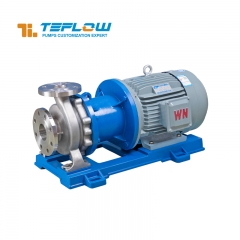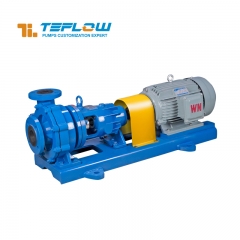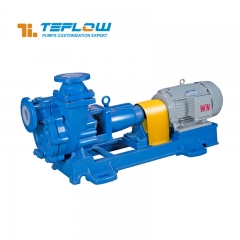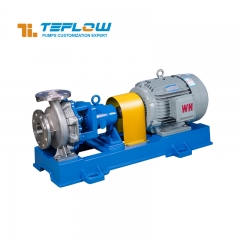In chemical production, corrosion-resistant centrifugal pumps are responsible for transporting corrosive media such as acids, alkalis, and salt solutions. The sealing performance of their oil seals is directly related to production safety and equipment stability. Compared with ordinary centrifugal pumps, the oil seal leakage problem of this type of equipment is often closely related to factors such as medium characteristics and anti-corrosion design.
1.Corrosion and penetration of media
The media transported by corrosion-resistant centrifugal pumps are mostly highly corrosive, which is one of the core factors leading to oil seal leakage. Even if the main body of the equipment is made of corrosion-resistant materials, the contact area between the oil seal and the medium may still be corroded. For example, acidic media will gradually damage the rubber sealing lip of the oil seal, causing it to swell, crack or harden, resulting in a decrease in the sealing performance between the sealing lip and the shaft. At the same time, some small molecular media will penetrate through the microscopic pores of the oil seal material. After long-term accumulation, it will break through the sealing boundary, causing cross-contamination between the lubricating oil and the medium, which will manifest as oil leakage at the oil seal.
2.The combined effects of temperature and pressure fluctuations
Frequent fluctuations in medium temperature and delivery pressure during chemical production can exacerbate seal failure. High-temperature media not only accelerates the aging process of oil seal materials, causing the rubber to lose elasticity, but also causes the viscosity of the lubricating oil to decrease, increasing its fluidity and increasing the risk of leakage. Pressure fluctuations can disrupt the dynamic sealing balance between the oil seal and the shaft. When the pressure rises instantly, the medium may break through the contact pressure of the sealing lip and cause leakage; when the pressure drops suddenly, outside air enters the sealing cavity, causing cavitation, further wearing the oil seal surface and causing oil leakage.
3.Increased corrosion and wear of the shaft surface
The pump shaft that matches the oil seal is prone to special damage in a corrosive environment. The corrosive ions in the medium can cause pitting and uniform corrosion on the shaft surface, forming tiny pits or rough surfaces, destroying the tight fit between the shaft and the oil seal lip, and causing lubricating oil to leak from the corrosion defects. In addition, even after filtering, the solid particulate impurities often contained in chemical media may still retain tiny particles. These particles will abrade the oil seal lip and the shaft surface as the shaft rotates, causing increased wear on the shaft surface and forming irregular scratches, further deteriorating the sealing effect.
4.Failure of anti-corrosion coating and installation deviation
To improve shaft corrosion resistance, some pump shafts are plated or coated. However, these anti-corrosion layers can become damaged during installation and operation. If tools scratch the shaft coating during installation, or if friction between the sealing lip and the coating edge during oil seal press-fit causes the coating to peel, the exposed shaft surface can come into direct contact with the corrosive medium, accelerating corrosion damage to the shaft and indirectly causing oil seal leakage. Furthermore, if specialized oil seals designed for chemical pumps are not strictly aligned with the center axis during installation, or if the compression volume does not meet the media characteristics, uneven force on the sealing lip can result, accelerating seal failure under the continued action of the corrosive medium.
5.Ignoring special maintenance
If the maintenance of chemical centrifugal pumps does not take the medium characteristics into consideration, it is very easy to cause oil seal leakage. For example, if the selected oil has compatibility issues with the conveying medium when replacing the lubricating oil, emulsification or chemical reaction may occur, destroying the performance of the oil seal material; after long-term operation, the medium crystals or corrosion products attached to the oil seal are not cleaned in time, and these substances will harden and wear the oil seal lip; during maintenance, the tools for removing the oil seal are contaminated with corrosive media, and the new oil seal is installed without cleaning, which will cause the new oil seal to be corroded and damaged prematurely.
In short, the oil seal leakage problem of the corrosion-resistant centrifugal pump needs to be comprehensively judged based on the corrosiveness of the medium, the volatility of the working conditions and the details of the anti-corrosion design. In actual operation and maintenance, targeted oil seal materials that are resistant to medium corrosion should be selected, the shaft surface corrosion protection process should be optimized, temperature and pressure monitoring should be strengthened, and maintenance procedures adapted to chemical industry scenarios should be developed to effectively reduce the risk of oil leakage and ensure safe equipment operation.





 +86 18130251359
+86 18130251359 teflowpumps@tlpumps.com
teflowpumps@tlpumps.com













 +86+0563-5093318
+86+0563-5093318
